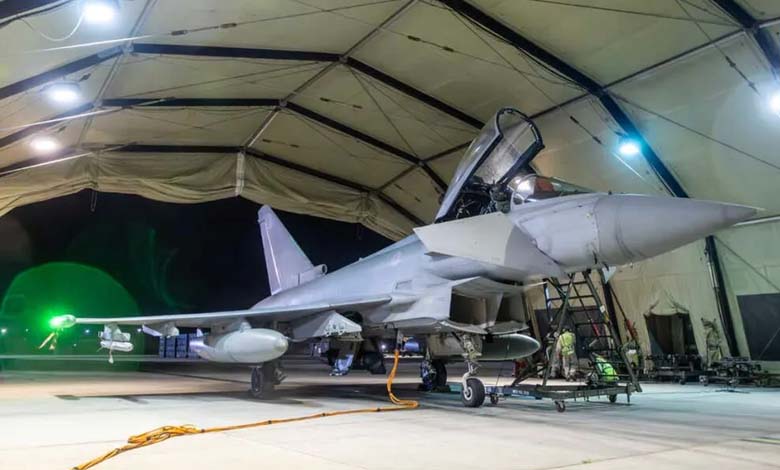American-British Strikes Target Houthi Defense Systems Across Yemen
Targets included underground weapons depots for the Houthis, missile storage facilities, drones, air defense systems, and radar installations

American and British forces carried out a series of fresh strikes against Houthi targets in three Yemeni provinces, marking the first time in about three weeks that aircraft from both countries have resumed targeting Sanaa. The Houthis declared that American and British interests are now legitimate targets.
A joint statement, following weeks of attacks by Iran-backed rebels on ships in the Red Sea, stated that “necessary and proportionate strikes specifically targeted 18 Houthi targets in eight locations in Yemen linked to underground weapons storage facilities, missile storage facilities, single-directional unmanned aerial systems, air defense systems, radars, and helicopters.”
The statement was signed by Australia, Bahrain, Denmark, Canada, the Netherlands, and New Zealand, who provided unspecified “support” for the new series of strikes, the second this month and the fourth since the start of Houthi attacks on ships in the Red Sea.
The statement added that “more than 45 Houthi attacks on commercial and military vessels since mid-November pose a threat to the global economy as well as regional security and stability, requiring an international response.”
The Pentagon stated in a release that “these precise strikes aimed to disrupt and weaken the capabilities used by the Houthis to threaten global trade, maritime vessels, and the lives of innocent sailors.”
U.S. Defense Secretary Lloyd Austin said, “The United States will not hesitate to take action, as needed, to defend lives and ensure the free flow of commerce through one of the world’s most important maritime corridors.”
Austin added, “We will continue to make it clear to the Houthis that they will bear the consequences if they do not halt their unlawful attacks that harm Middle Eastern economies, cause environmental damage, and disrupt the delivery of humanitarian aid to Yemen and other countries.”
In London, the Ministry of Defense clarified that four Royal Air Force Typhoon fighter jets, along with two tanker aircraft, participated in the strikes.
This Saturday’s operation follows several attacks on commercial ships this week, including the Rubimar ship carrying fertilizers, whose crew had to be evacuated after being hit on Sunday and began taking on water.
Yahya Saree, military spokesman for Yemen’s Houthi rebels, said the Houthis had targeted the MV Form oil tanker, flying the American flag, owned and operated by the United States in the Gulf of Aden.
He added in a televised address that the group had targeted the tanker “with a number of appropriate maritime missiles.”
Mohammad Ali al-Houthi, a member of the Supreme Political Council of the group, said on his X platform that they would allow the withdrawal of the sunken British ship “Rubimar” in the Gulf of Aden in exchange for the introduction of humanitarian aid to Gaza. He added, “This is a proposal to be studied,” without providing further details.
On February 18, the Houthis announced they had targeted the British cargo ship “Rubimar” in the Gulf of Aden with several maritime missiles, causing severe damage and endangering it from sinking, carrying large quantities of ammonia and oils, according to the official Saba agency.
The U.S. Central Command said the Mason (DDG 87) ship successfully intercepted an anti-ship ballistic missile launched toward the Gulf of Aden from Houthi-controlled areas, likely targeting the tanker.
The U.S. Central Command added in a statement that neither the Mason nor the oil tanker sustained any damage, and no injuries were reported.
In addition to joint operations with Britain, the United States carried out unilateral strikes against Houthi sites in Yemen, citing self-defense, and destroyed aerial and maritime drones in the Red Sea.
The Houthis claim they target ships associated with Israel in support of Palestinians in Gaza, devastated by the war between Israel and Hamas. They say they want to end Israeli attacks on Gaza.
Following the initial American-British strikes, the Houthis announced that the interests of both countries were also legitimate targets.
Anger is rising across the Middle East in the wake of Israel’s devastating campaign in Gaza, resulting in attacks targeting Israeli and American interests, notably by Iran-backed armed factions in Lebanon, Iraq, Syria, and Yemen.












